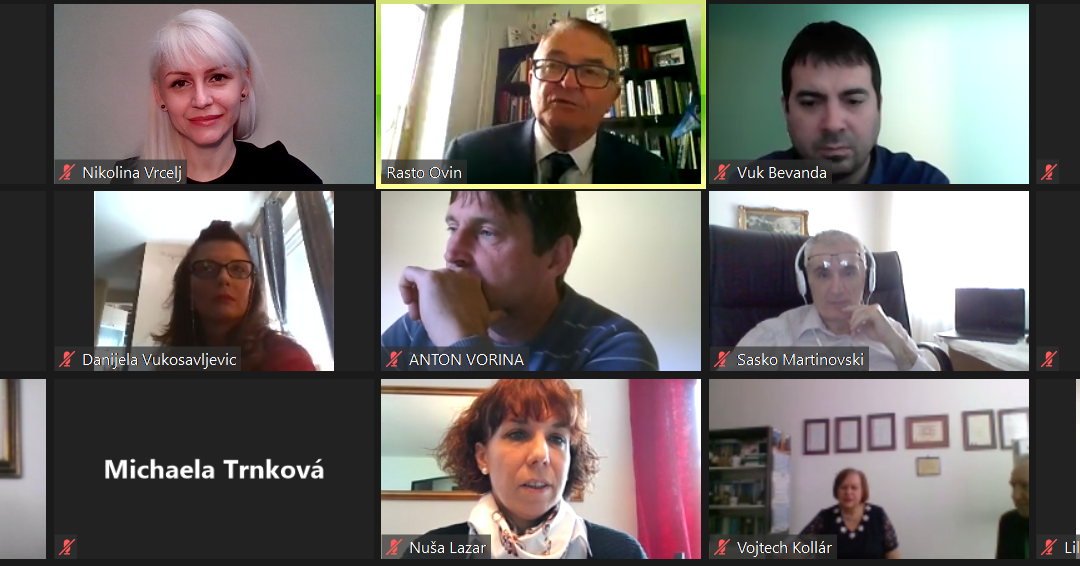Applied Theory of Markets and Sustainable Growth – A Different Perspective
Rasto Ovin – DOBA Business School, Prešernova ulica 1, 2000 Maribor, Slovenia
Nuša Lazar – Dekorina d.o.o., Glavni trg 17/b, 2000 Maribor, Slovenia
7th International Scientific ERAZ Conference – ERAZ 2021 – Conference Proceedings: KNOWLEDGE BASED SUSTAINABLE DEVELOPMENT, Online/virtual, May 27, 2021
ERAZ Conference Proceedings published by: Association of Economists and Managers of the Balkans – Belgrade, Serbia
ERAZ conference partners: Faculty of Economics and Business, Mediterranean University, Montenegro; University of National and World Economy – Sofia, Bulgaria; Faculty of Commercial and Business Studies – Celje, Slovenia; AMBIS University, Prague – Czech Republic; Faculty of Applied Management, Economics and Finance – Belgrade, Serbia
ERAZ Conference 2021 Conference Proceedings: ISBN 978-86-80194-46-2, ISSN 2683-5568, DOI: https://doi.org/10.31410/ERAZ.2021
Keywords:
Political market;
External effects of ignorant
politics;
Retaining of civilization
standards
Abstract: The term “sustainable growth” the authors will apply to the social and partly economic field and not to ecology – natural environment, which is usually the case. The use of the term “applied theory of markets” derives from the fact that a new insight of markets functioning will be discussed – based on empirical facts and data if necessary. This paper will start from the Arrow-Debreu model (1954) and its interpretation as a theory by Radner (1970 in: Majumdar 1998). It will be argued that the absence of considering all possible markets although they proved to be functioning, brought unwanted consequences, which in some respect are threatening to turn the civilization clock back and are pushing contemporary priorities. From the view of the applied theory of markets, the sources of destructive national politics becoming reality in some countries will be discussed and possibly explained.

ERAZ Conference
Creative Commons Non Commercial CC BY-NC: This article is distributed under the terms of the Creative Commons Attribution-Non-Commercial 4.0 License (https://creativecommons.org/licenses/by-nc/4.0/) which permits non-commercial use, reproduction and distribution of the work without further permission.

References
Anstey, C. (2019). We need an economic model that works for people and the planet. World Economic Forum. September 23, 2019. Retrieved June 28, 2021, from: https://www.weforum. org/agenda/2019/09/how-to-make-markets-more-sustainable/
Bayer, J., & Bárd, P. (2020). Hate speech and hate crime in the EU and the evaluation of online content regulation approaches. B russels, B elgium: P olicy D epartment f or C itizens’ Rights and Constitutional Affairs, European Parliament. Retrieved July 2, 2021, from: https://www.europarl.europa.eu/RegData/etudes/STUD/2020/655135/IPOL_ STU%282020%29655135_EN.pdf
BBC. (2019). Europe and right-wing nationalism: A country-by-country guide. Retrieved July 18, 2021, from: https://www.bbc.com/news/world-europe-36130006
Butler, P., & Collins, N. (1996). Strategic analysis in political markets. European Journal of Marketing, 30(10/11), 25-36. https://doi.org/10.1108/03090569610149773
Carter-Ruck (2018). Fake News, Authentic Views (A Carter-Ruck Report, 2018). London, Great Britain: Carter-Ruck. Retrieved July 2, 2021, from: https://www.carter-ruck.com/insight/ fakes-news-authentic-views/
Hoffman, A. J. (2018). The Next Phase of Business Sustainability. Stanford Social Innovation Review – SSIR. Spring 2018. Retrieved June 28, 2021, from: https://ssir.org/articles/entry/ the_next_phase_of_business_sustainability.
Krause, E., & Sawhill, I.V. (2018). Seven reasons to worry about the American middle class. Retrieved August 3, 2021, from: https://www.brookings.edu/blog/social-mobility-memos/2018/06/05/seven-reasons-to-worry-about-the-american-middle-class/
Lazar, N., Ovin, R., & Ašanin Gole, P. (2021). Structural change on the political market and the enterprise ecosystem. In P. Ašanin Gole (Eds.). Entrepreneurial and Communicative Mind in Action (pp. 6-15). Essex: Pearson Education Limited.
Majumdar, M. (1998). In: Majumdar, M. (Ed.) Organizations with incomplete information (pp. 1-19). Cambridge: Cambridge University Press.
N1. (2021). Novi dan. Interview Slobodan Stupar. [Video]. N1. https://www.youtube.com/ watch?v=0Esh4m4rFTc
OECD. (2019). Beyond Growth: Towards a New Economic Approach (Report of the Secretary General’s Advisory Group on a New Growth Narrative). Paris: OECD – Organisation for Economic Co-operation and Development. Retrieved June 24, 2021, from: https://www.oecd.org/ officialdocuments/publicdisplaydocumentpdf/?cote=SG/NAEC(2019)3&docLanguage=En
Ovin, R. (2017). Kdo je vazal EU? Primer enakopravnega sodelovanja z močnimi tujimi partnerji. In R. Ovin (Eds.). Dajmo prostor novemu znanju (Spoznanja iz ekonomskih ter upo rabnih poslovnih in družbenih študij): monografija Doba fakultete (pp. 177-188). Maribor: Doba, Fakulteta za uporabne poslovne in družbene študije.
Rosling, H., & Rosling, O. (2014). How not to be ignorant about the world. TEDSalon Berlin 2014 [Video]. Ted. https://www.ted.com/talks/hans_and_ola_rosling_how_not_to_be_ignorant_about_the_world
Statista (2020). Number of AfD party members in Germany from 2013 to 2019. Retrieved July 18, 2021, from: https://www.statista.com/statistics/957361/afd-party-membership-development/
The CEO Magazine (2021). 10 of the world’s most sustainable companies. February 16, 2021. Retrieved June 28, 2021, from: https://www.theceomagazine.com/business/management-leadership/sustainable-companies/
Večer (2021). Pozor, med potrjenimi okužbami v zadnjih dneh je bilo cepljenih več kot 13 odstotkov. NIJZ pojasnjuje, kaj bo s tretjim odmerkom. Večer. 5. 8. 2021. Maribor.
Vuk Godina, V. (2021). Levim političnim voditeljem ni ime Fajon ali Mesec. Pogledi. Večer. 15. 7. 2021. Maribor.
World Bank Blogs. (2014). Can political stability hurt economic growth?. Retrieved May 20, 2021, from https://blogs.worldbank.org/endpovertyinsouthasia/can-political-stability-hurt-economic-growth.
World Economic Forum. (2017). The Global Risks Report 2017 (12th Edition). World Economic Forum: Geneva. Retrieved July 2, 2021, from: http://reports.weforum.org/global-risks-2017/
Županov, J. (1983). Marginalije o društvenoj krizi. Lecture at the University of Maribor, November, 12th 1983.
Žurnal 24. (2021). Poklukar: «Nisem se cepil, ker sem minister, ampak …». Žurnal 24. Retrieved July 28, 2021, from: https://www.zurnal24.si/slovenija/poklukar-nisem-se-cepil-ker-sem-minister-ampak-370640

